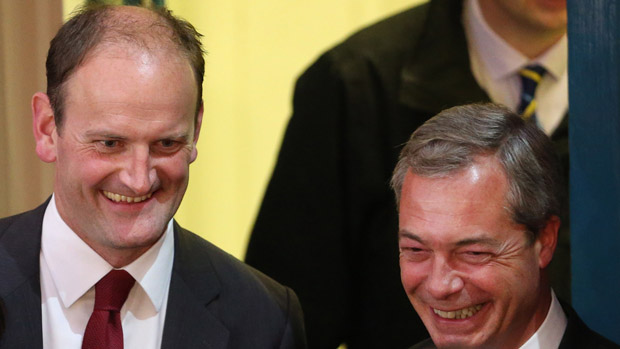If Britain had PR, Ukip would win 99 seats. Food for thought
Calls for proportional representation will come from all corners on 8 May. But there's a reason to ignore them

A free daily email with the biggest news stories of the day – and the best features from TheWeek.com
You are now subscribed
Your newsletter sign-up was successful
It is very likely – make that 100 per cent definite – that there will be calls from across the country for a new system of proportional representation once this election is over.
Lib Dems, Greens and Ukip voters will be asking why they have so few MPs considering their parties’ popular support. Others might be asking why the SNP has so many, considering its voter numbers.
But would PR really be a fairer solution? Martin Baxter of Electoral Calculus has been crunching the numbers for the Daily Telegraph to find out.
The Week
Escape your echo chamber. Get the facts behind the news, plus analysis from multiple perspectives.

Sign up for The Week's Free Newsletters
From our morning news briefing to a weekly Good News Newsletter, get the best of The Week delivered directly to your inbox.
From our morning news briefing to a weekly Good News Newsletter, get the best of The Week delivered directly to your inbox.
Using current predications of the expected vote share on 7 May, PR would deliver Ukip 99 seats, the Lib Dems 49, and the Greens 37 – many, many more than they can dare hope for under the current first-past-the-post system.
Labour would be down to 213, the Tories down to 201 and the SNP on 23 rather than the 50-plus currently predicted by pollsters.
Here comes the big BUT…
To reach the magic figure of 326 MPs needed for a Commons majority, no two parties’ MPs added together (excepting a highly unlikely ‘grand coalition’ of Labour and the Tories) would come anywhere near.
A free daily email with the biggest news stories of the day – and the best features from TheWeek.com
“Any coalition would have to be an unwieldy three, four, or even six- party affair,” says Baxter. “It would be a recipe for fractious and fractured government.”
Before we junk the current system due to a single “unfair” election result, Baxter urges us to consider this: the average vote share for the three major parties over the 29 general elections since the year 1900 has been 44 per cent for the Conservatives, 33 per cent for Labour, and 19 per cent for the Liberals.
Compare this with the amount of “governing time” the three parties have enjoyed (counting coalitions as ‘half-government’) over the same period: Conservatives 54 per cent, Labour 29 per cent and Liberals 12 per cent.
“Now those are not quite exact matches,” Baxter admits, “but it is not an appalling outcome that flies in the face of democracy… When the losers clamour for change after the May election, we should resist their calls to chase the illusion of perfectability.”
Whether this cuts any ice with the pro-PR brigade remains to be seen - there could be some very angry voters around on 8 May. For instance, according to opinion polls, Ukip currently enjoy a 12-14 per cent share of the nation vote. But under the first-past-the-post system, the Faragists are predicted to win only one or two seats. Not 99.
-
 Political cartoons for February 21
Political cartoons for February 21Cartoons Saturday’s political cartoons include consequences, secrets, and more
-
 Crisis in Cuba: a ‘golden opportunity’ for Washington?
Crisis in Cuba: a ‘golden opportunity’ for Washington?Talking Point The Trump administration is applying the pressure, and with Latin America swinging to the right, Havana is becoming more ‘politically isolated’
-
 5 thoroughly redacted cartoons about Pam Bondi protecting predators
5 thoroughly redacted cartoons about Pam Bondi protecting predatorsCartoons Artists take on the real victim, types of protection, and more
-
 How corrupt is the UK?
How corrupt is the UK?The Explainer Decline in standards ‘risks becoming a defining feature of our political culture’ as Britain falls to lowest ever score on global index
-
 The high street: Britain’s next political battleground?
The high street: Britain’s next political battleground?In the Spotlight Mass closure of shops and influx of organised crime are fuelling voter anger, and offer an opening for Reform UK
-
 Nigel Farage’s £9mn windfall: will it smooth his path to power?
Nigel Farage’s £9mn windfall: will it smooth his path to power?In Depth The record donation has come amidst rumours of collaboration with the Conservatives and allegations of racism in Farage's school days
-
 Is a Reform-Tory pact becoming more likely?
Is a Reform-Tory pact becoming more likely?Today’s Big Question Nigel Farage’s party is ahead in the polls but still falls well short of a Commons majority, while Conservatives are still losing MPs to Reform
-
 Nigel Farage: was he a teenage racist?
Nigel Farage: was he a teenage racist?Talking Point Farage’s denials have been ‘slippery’, but should claims from Reform leader’s schooldays be on the news agenda?
-
 Five takeaways from Plaid Cymru’s historic Caerphilly by-election win
Five takeaways from Plaid Cymru’s historic Caerphilly by-election winThe Explainer The ‘big beasts’ were ‘humbled’ but there was disappointment for second-placed Reform too
-
 Taking the low road: why the SNP is still standing strong
Taking the low road: why the SNP is still standing strongTalking Point Party is on track for a fifth consecutive victory in May’s Holyrood election, despite controversies and plummeting support
-
 The end of ‘golden ticket’ asylum rights
The end of ‘golden ticket’ asylum rightsThe Explainer Refugees lose automatic right to bring family over and must ‘earn’ indefinite right to remain